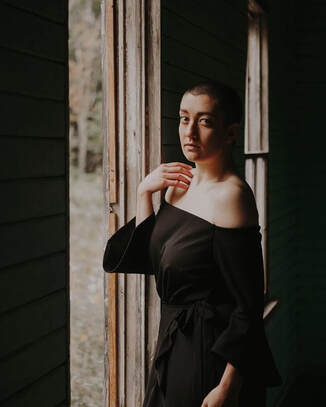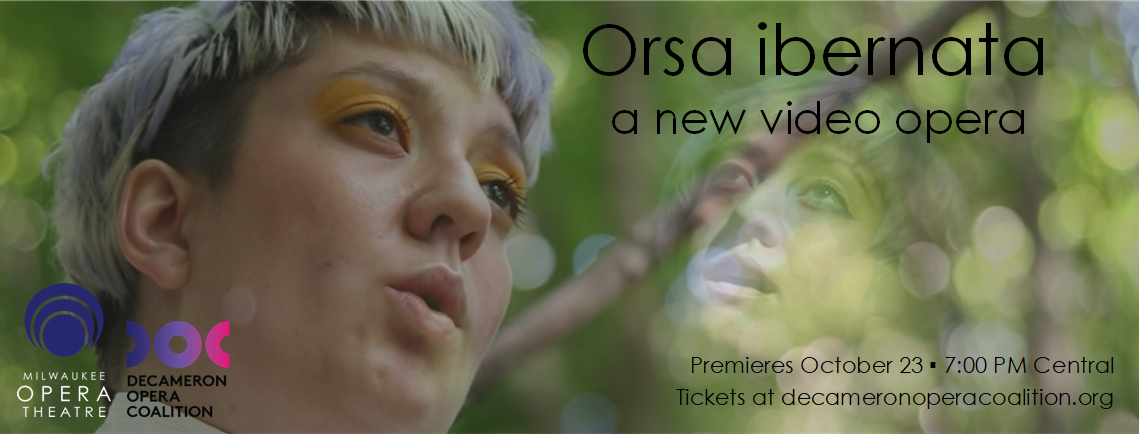From "Orsa ibernata" composer and performer Elizabeth Blood...

The pandemic had hit and it felt like a forced, yet needed, hibernation for me. At the time I was asked to compose for this project, I had been doing a lot of inner work to truly connect with my Self. The slowdown of life lended itself to introspection, self-reflection, and insight, which ultimately became my inspiration to agree to the project and write this music. While a bit abstract, Danny and I were able to develop a concept that seemed to fit well with a couple of our favorite tales from The Decameron.
When I received Danny's libretto, I happened to be visiting my family in Merrill, my hometown. I am based in Milwaukee now, and have been since I graduated college, but grew up in this small town in Wisconsin's Northwoods. Of course, I had visited over the years, but the pandemic had allowed a literal expression of hibernation: returning home for respite. That week ended up being really important--being with family and being home again. And there is something magical about where I am from. There was an openness to the sky that I had forgotten. I didn't have to work to bring air into my lungs--the breeze did it for me. The trees felt like my protectors. Even the Moon glowed differently. It's like all the spirits of the natural world could reveal themselves to me a little more easily among the stillness, and somehow in their revealing, I could connect to my Self.
Libretto in hand, my first inclination was to let the words settle in my body, step outside, and improvise. I went to forested areas where I could sit on the earth along the Wisconsin River and Pickerel Lake. I watched the water swirl around. Reflect and warp the world above it. Vibrate. Sparkle sharp spears of light from the Sun or Moon. I watched leaves fall into it. Critters swimming above or inside. Stirring it with my fingers. And then I sang. All of these things make their own music, but I wanted to explore what a voice could directly interpret from these images and sensations, blooming from a deep sense of Self.
These ideas became the foundation of this largely improvisational piece of music. If I were to describe my score, I’d say it’s a map for vocal colors, as well as settings to visualize. The performer finds answers for how to sing this music from being curious about what they experience in their mind's eye and using their voice to interpret it. I’m really excited by the idea that if any one person were to sing from my score, it would be utterly different each time.
Along with that, I assigned vocal colors to the characters. For example, the Woman, who is technically alive in the piece, actually has a less vivacious sound--more breathy and stippled with imperfections. The closer she comes to death and finding her Lover--the Lover representing her heart, her soul, her Self--her colors and qualities strengthen. In the same way, the Lover has a purer, more grounded vocal quality, but at times uses the Woman’s colors and imperfections to lure her closer. There are other characters, too, in a sense--the woods, memories, feeling lost or coming to a decision, the hum between realms--each personified with a voice.
Whether or not people grasp my intent, I’m really curious about and enjoy hearing what people come away with. Nevertheless, here’s what I went into it to say: Let us allow ourselves to sit in stillness, even when it might be uncomfortable, even when the chaos of the world is swirling and burning around us and inside of us. To step away from the things we distract ourselves with, just for a little while, and simply face ourselves. I think our society has come to a place where we need to be stimulated constantly, and reasons for stillness have become lost. For me, stillness is showing up for myself and offering a moment to my voice. It’s often uncomfortable, but I’ve learned that facing myself and sitting in discomfort brings healing and creates space, so that I can show up stronger, so that I can be of better service and support to my world in my own way. The beauty, when we heal and create space to show up fully in our unique ways, can be, and is, incredibly powerful.
When I received Danny's libretto, I happened to be visiting my family in Merrill, my hometown. I am based in Milwaukee now, and have been since I graduated college, but grew up in this small town in Wisconsin's Northwoods. Of course, I had visited over the years, but the pandemic had allowed a literal expression of hibernation: returning home for respite. That week ended up being really important--being with family and being home again. And there is something magical about where I am from. There was an openness to the sky that I had forgotten. I didn't have to work to bring air into my lungs--the breeze did it for me. The trees felt like my protectors. Even the Moon glowed differently. It's like all the spirits of the natural world could reveal themselves to me a little more easily among the stillness, and somehow in their revealing, I could connect to my Self.
Libretto in hand, my first inclination was to let the words settle in my body, step outside, and improvise. I went to forested areas where I could sit on the earth along the Wisconsin River and Pickerel Lake. I watched the water swirl around. Reflect and warp the world above it. Vibrate. Sparkle sharp spears of light from the Sun or Moon. I watched leaves fall into it. Critters swimming above or inside. Stirring it with my fingers. And then I sang. All of these things make their own music, but I wanted to explore what a voice could directly interpret from these images and sensations, blooming from a deep sense of Self.
These ideas became the foundation of this largely improvisational piece of music. If I were to describe my score, I’d say it’s a map for vocal colors, as well as settings to visualize. The performer finds answers for how to sing this music from being curious about what they experience in their mind's eye and using their voice to interpret it. I’m really excited by the idea that if any one person were to sing from my score, it would be utterly different each time.
Along with that, I assigned vocal colors to the characters. For example, the Woman, who is technically alive in the piece, actually has a less vivacious sound--more breathy and stippled with imperfections. The closer she comes to death and finding her Lover--the Lover representing her heart, her soul, her Self--her colors and qualities strengthen. In the same way, the Lover has a purer, more grounded vocal quality, but at times uses the Woman’s colors and imperfections to lure her closer. There are other characters, too, in a sense--the woods, memories, feeling lost or coming to a decision, the hum between realms--each personified with a voice.
Whether or not people grasp my intent, I’m really curious about and enjoy hearing what people come away with. Nevertheless, here’s what I went into it to say: Let us allow ourselves to sit in stillness, even when it might be uncomfortable, even when the chaos of the world is swirling and burning around us and inside of us. To step away from the things we distract ourselves with, just for a little while, and simply face ourselves. I think our society has come to a place where we need to be stimulated constantly, and reasons for stillness have become lost. For me, stillness is showing up for myself and offering a moment to my voice. It’s often uncomfortable, but I’ve learned that facing myself and sitting in discomfort brings healing and creates space, so that I can show up stronger, so that I can be of better service and support to my world in my own way. The beauty, when we heal and create space to show up fully in our unique ways, can be, and is, incredibly powerful.
"Orsa ibernata" is available to stream until the end of the year!
Tickets still available!
Learn about Librettist and Director Danny Brylow's creative process.
Tickets still available!
Learn about Librettist and Director Danny Brylow's creative process.


